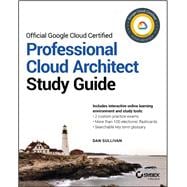Sybex's proven Study Guide format teaches Google Cloud Architect job skills and prepares you for this important new Cloud exam.
The Google Cloud Certified Professional Cloud Architect Study Guide is the essential resource for anyone preparing for this highly sought-after, professional-level certification. Clear and accurate chapters cover 100% of exam objectives—helping you gain the knowledge and confidence to succeed on exam day. A pre-book assessment quiz helps you evaluate your skills, while chapter review questions emphasize critical points of learning. Detailed explanations of crucial topics include analyzing and defining technical and business processes, migration planning, and designing storage systems, networks, and compute resources. Written by Dan Sullivan—a well-known author and software architect specializing in analytics, machine learning, and cloud computing—this invaluable study guide includes access to the Sybex interactive online learning environment, which includes complete practice tests, electronic flash cards, a searchable glossary, and more.
Providing services suitable for a wide range of applications, particularly in high-growth areas of analytics and machine learning, Google Cloud is rapidly gaining market share in the cloud computing world. Organizations are seeking certified IT professionals with the ability to deploy and operate infrastructure, services, and networks in the Google Cloud. Take your career to the next level by validating your skills and earning certification.
- Design and plan cloud solution architecture
- Manage and provision cloud infrastructure
- Ensure legal compliance and security standards
- Understand options for implementing hybrid clouds
- Develop solutions that meet reliability, business, and technical requirements
The Google Cloud Certified Professional Cloud Architect Study Guide is a must-have for IT professionals preparing for certification to deploy and manage Google cloud services.








